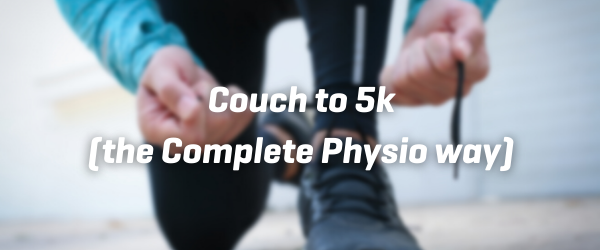A 10 week progressive program to get you safely running 5km with strength & confidence
Reece Noble (B.Physio, M. ExSci) – 2021
WHY FOLLOW A COUCH TO 5KM PROGRAM?
Running is a wonderful activity for improving overall health and well being. It is very convenient and easy to access needing only a pair of trainers and a suitable path to run on.
Unfortunately, despite its easy accessibility, running remains a sport with a very high injury rate. Injury rates for running have been reported as high as 38 injuries per 1000 hours of running (1). For comparison, recreational football has an injury rate of 38.6 injuries per 1000 hours played (2).
The scientific literature shows quite clearly that the biggest risk factors for runners developing an injury are lack of experience as a runner, increasing running load/volume quickly (put simply “too much, too soon”) and having a pre-existing injury (3).
From our experience, as physiotherapists who treat 100’s of runners with injuries every year, a lack of strength in the lower limbs most certainly plays a role in runners developing injuries.
Taking all of this into consideration “Couch to 5K the Complete Physio Way” has been written as a guide for inexperienced runners to give you the best chance of running your first 5km with strength, confidence, and injury-free.
ABOUT THIS PROGRAM
The Complete Physio couch to 5km running program has been written by experienced physiotherapist and strength coach Reece Noble.
Where this program differentiates itself from the multitude of couch to 5km programs is with the inclusion of strength training, an important but often overlooked aspect of any run training program
The basic structure of the program, running progressions and strength exercises to be completed are outlined below.
WHAT YOU WILL NEED
For the running aspect of the program, you will need the following:
- A pair of trainers (we suggest having a pair fitted at a reputable running shop)
- A watch or phone to keep time
- A route that has a flat, reliable surface or treadmill
For the strength part of the program you will need:
- Small Exercise Band loops (around 600mm)
- An exercise mat (suggested but not essential)
- A 5kg weight (or household item)
- A phone, laptop or tablet to view the exercise tutorial video
BASIC STRUCTURE
Each of the 10 weeks of this program includes 3 run/walk sessions, 2 strength sessions and 2 rest days
Whilst these days can be switched around to suit your schedule, the recommended structure over a week is as follows
- Monday – Run/walk
- Tuesday – Rest
- Wednesday – Run/walk
- Thursday – Strength
- Friday – Rest
- Saturday – Run/Walk
- Sunday – Strength
Despite this program being structured to minimise your risk of developing an injury, there is no way to completely prevent running related injuries.
It is EXTREMELY IMPORTANT if you currently have or develop any of the following, that you consult a physiotherapist or other trusted health care professional ASAP
- Pre existing injuries (particularly if running related)
- Focal areas of tenderness on boney areas
- Swelling
- Pain during running that occurs two or more runs in a row
- Localised muscle pain that lasts for greater than 24 hours after your run
Watch our intro video
RUNNING
There are 3 running sessions per week. The main part of all running sessions will be 30 minutes in length. Each session will be made up of running and walking – with the running time increasing and walking time decreasing each week. The pace you run should be a pace you can comfortably hold a conversation at
WARM UP
To warm up for each session we suggest these 4 exercises

Watch our warm up video
RUNNING PROGRESSION PLAN WEEK 1-9
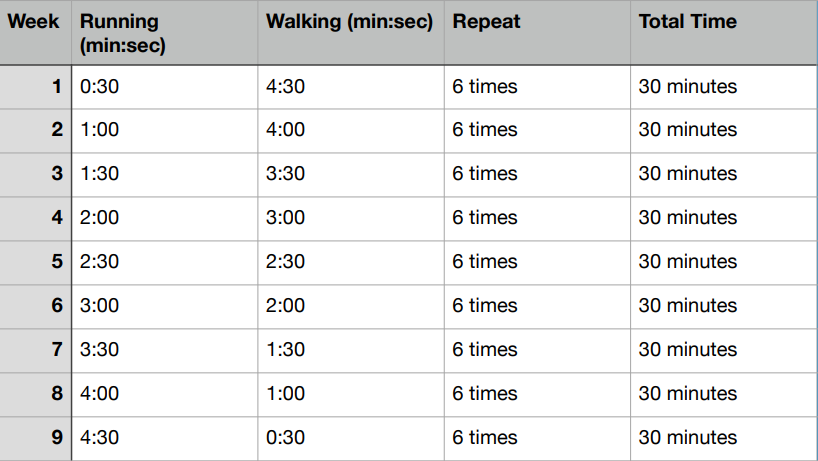
RUNNING PROGRESSION PLAN WEEK 10
Week 10 has a slight adjustment where the 3rd run is your first continuous 5km (well done!!!)

STRENGTH TRAINING
One of the biggest mistakes runners of all levels make is that they do not include strength training in their running program.
Being strong is important for runners as it builds tissue resilience which is protective against injury and also makes you a more efficient runner.
The strength exercises are divided into 3 blocks of 4 weeks, 3 weeks and 3 weeks respectively. Each block has 6 exercises, which are 2 days per week. See the full strength exercises on the next page.
STRENGTH TRAINING
There are 2 strength training sessions per week.
Strength exercises will be done in 3 blocks.
- Block 1 – weeks 1-3
- Block 2 – weeks 4-6
- Block 3 – 7-10
Each block is a progression on the last. Each exercise should be done to an effort level of 8/10, meaning you could do 2-3 more reps (i.e. not done to exhaustion).
If by the suggested number of reps and sets you haven’t reach 8/10, consider progressing the exercises, if greater than 8/10 effort, consider regressing the exercise.
BLOCK 1
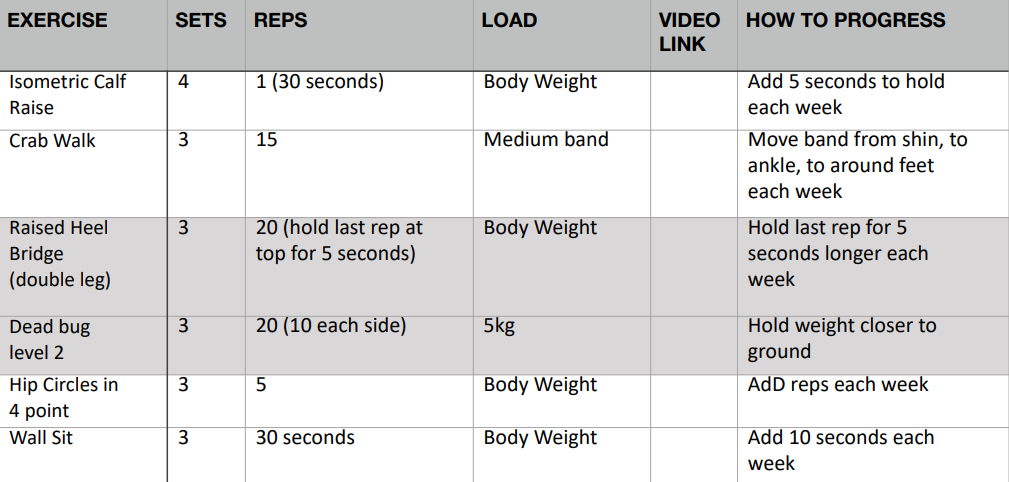
STRENGTH TRAINING
BLOCK 2
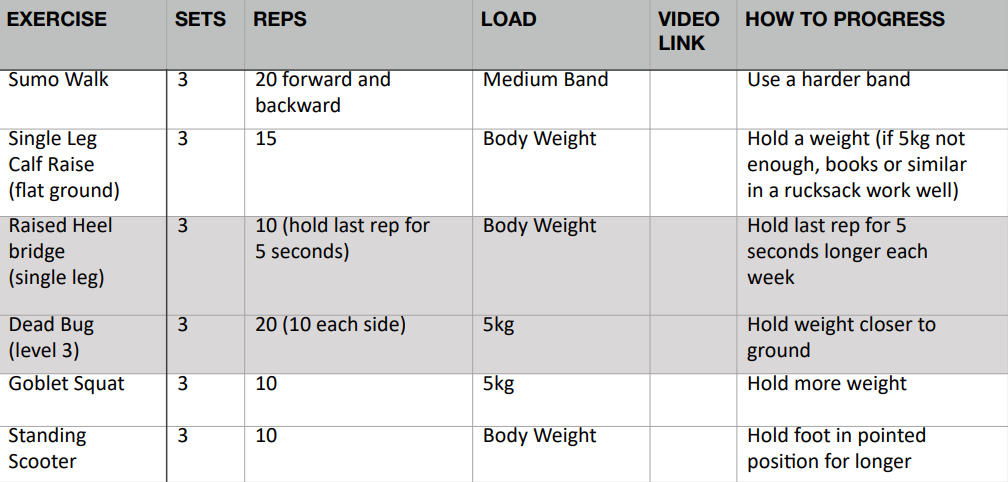
BLOCK 3
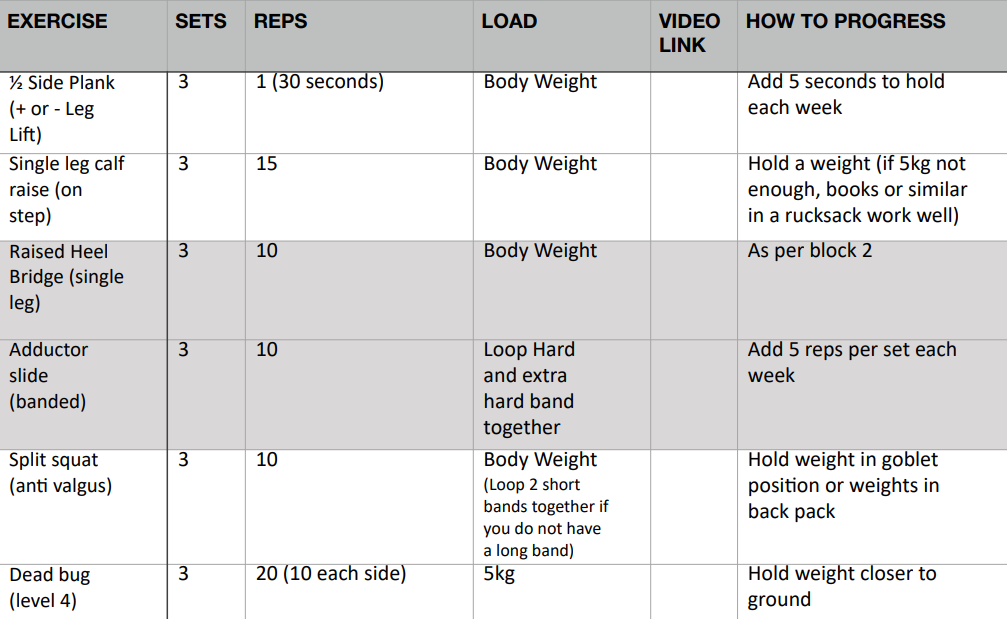
TO CONCLUDE
As outlined above, running is a wonderful form of exercise for both physical and mental health, but care does need to be taken when commencing running as a form of exercise. We hope you have found this guide a useful and easy to follow resource to help you build up to your first 5km run confidently, safely and injury free. If you have further questions with regard to the “Couch to 5k the Complete Physio Way” please contact Reece Noble at reece@complete-physio.co.uk
ABOUT THE AUTHOR
Reece has over 10 years experience as a physiotherapist working with hundreds of runners to help them run pain and injury free. He is also a strength coach having completed a Masters of Exercise Science (Strength & Conditioning) in 2017. Reece is also a very keen runner himself, regularly participating in long distance running events such as marathons and long distance triathlons.
REFERENCES
- Nielsen, R. O., Buist, I., Sørensen, H., Lind, M., & Rasmussen, S. (2012). Training errors and running related injuries: a systematic review. International journal of sports physical therapy, 7(1), 58.
- Dönmez, G., Korkusuz, F., Özçakar, L., Karanfil, Y., Dursun, E., Kudas, S., & Doral, M. N. (2018). Injuries among recreational football players: results of a prospective cohort study. Clinical Journal of Sport Medicine, 28(3), 249-254.
- Linton, L., & Valentin, S. (2018). Running with injury: a study of UK novice and recreational runners and factors associated with running related injury. Journal of science and medicine in sport, 21(12), 1221-1225.
Don’t let pain hold you back, book now!


